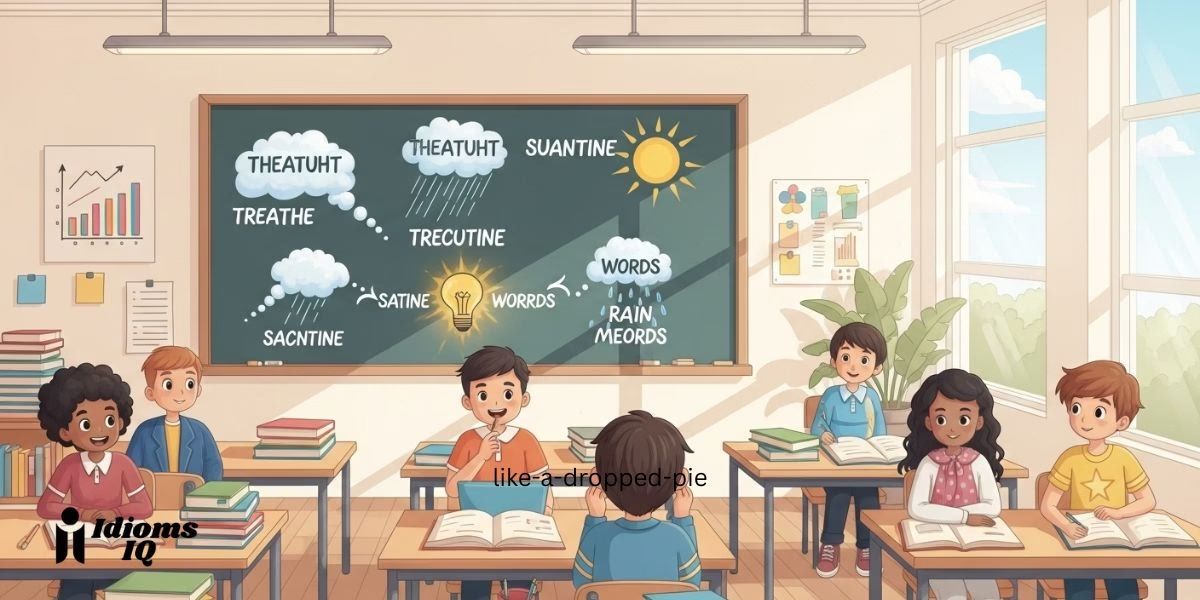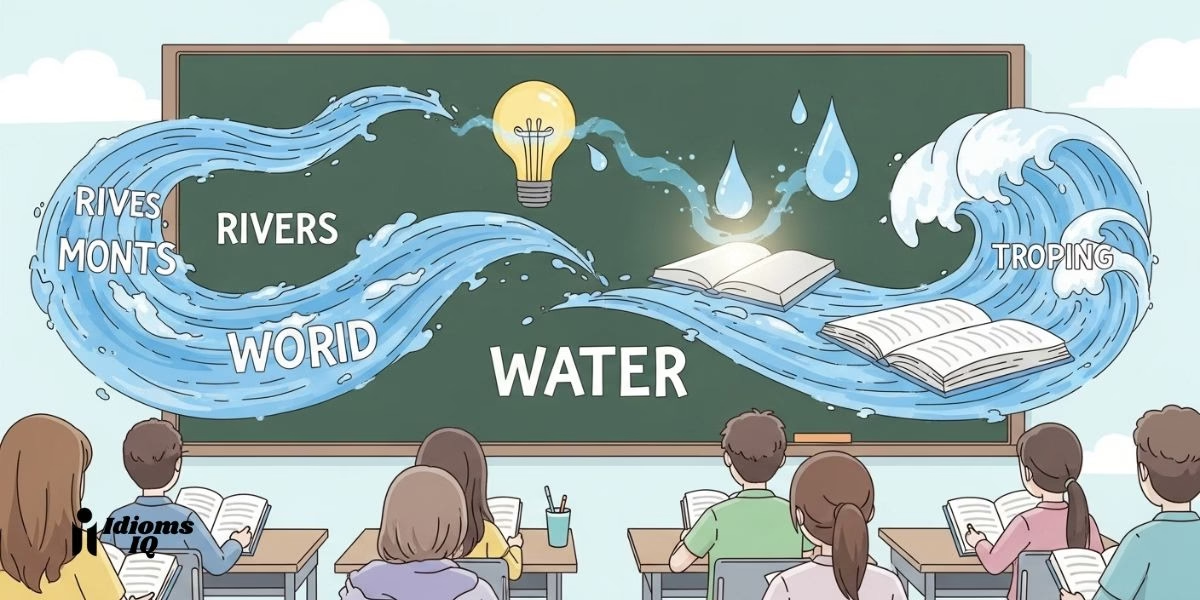
Weather is the grand, unpredictable drama of our daily lives. It can be a gentle backdrop or a furious protagonist, shaping our moods, our plans, and our stories. But how do we describe something as immense and ever-changing as the weather? We use the creative power of metaphor. A metaphor is a figure of speech that illuminates our world by stating one thing is another, forging a powerful and imaginative link that simple descriptions can’t match. For instance, “the snow is a white blanket” is a metaphor because it compares the snow to a blanket, showing how vividly language can transform an ordinary scene into something poetic.
In art and literature, metaphors are essential for breathing life into the atmosphere. They give the wind a voice and the sun a personality. This article explores 40 striking metaphors for various weather phenomena, complete with their meanings and examples, to help you describe the world around you with more artistic depth and emotional precision.
Related: Metaphors for Light
Why We Use Metaphors for Weather
Weather is a physical force, but its true impact is often emotional. Metaphors are the bridge between the external weather and our internal feelings. They allow us to give the weather a personality and a purpose. Is a storm a “raging beast” or is the sky an “angry god”? Is the sunshine a “warm blanket” of comfort? For artists, poets, and writers, these metaphors are fundamental for setting the tone of a scene, symbolizing a character’s emotional state, and transforming the atmosphere from a passive background into a tangible, active character in the narrative.
Metaphors for Weather
Here is a collection of metaphors that explore the many different moods of the sky, from violent storms to peaceful sunshine.
Storms & Anger
1. The Storm is a Raging Beast
- Meaning: The storm is a violent, wild, and uncontrollable animal.
- Usage Example: “We hid inside as the storm, a raging beast, tore branches from the trees.”
- This metaphor is used to describe the savage, destructive power of a severe storm.
2. The Sky is an Angry God
- Meaning: The heavens are a powerful, divine entity expressing immense displeasure.
- Usage Example: “With every crash of thunder, it felt like the sky was an angry god, passing judgment on the world below.”
- This ancient metaphor gives storms a mythic and terrifying quality.
3. Thunder is a Drumroll of War
- Meaning: The sound of thunder is the ominous, rhythmic signal of a coming battle (the storm).
- Usage Example: “The distant thunder was a drumroll of war, announcing the arrival of the hurricane.”
- This auditory metaphor builds suspense and a sense of impending conflict.
4. The Wind is a Fury
- Meaning: The wind is an embodiment of pure, violent, and unrestrained anger.
- Usage Example: “The wind was a fury, screaming through the canyons and ripping at the rooftops.”
- This metaphor personifies the wind with intense, vengeful emotion.
Rain & Sadness
5. The Rain is the Sky’s Tears
- Meaning: Rain is an expression of sadness or grief from the heavens.
- Usage Example: “As she looked at the old, abandoned house, the rain felt like the sky’s tears for a forgotten time.”
- This classic metaphor directly links rain to the human emotion of sorrow.
6. The Drizzle is a Grey Veil
- Meaning: A light, misty rain that obscures the world and covers it in a soft, mysterious layer.
- Usage Example: “The city was hidden behind a grey veil of drizzle, its sharp edges softened.”
- This metaphor emphasizes the way light rain can create a mysterious and subdued atmosphere.
7. The Grey Sky is a Heavy Heart
- Meaning: An overcast, sunless sky represents a mood of sadness, depression, or emotional weight.
- Usage Example: “His mood matched the weather; the grey sky was a heavy heart hanging over the world.”
- This metaphor directly connects the appearance of the sky to an internal emotional state.
Sun & Happiness
8. The Sun is a Golden Eye
- Meaning: The sun is a single, all-seeing, and powerful entity watching over the world.
- Usage Example: “At noon, the sun was a golden eye in the sky, leaving no place for shadows to hide.”
- This metaphor gives the sun a sense of consciousness and powerful observation.
9. Sunshine is a Warm Blanket
- Meaning: Sunshine provides a comforting, secure, and cozy feeling of warmth.
- Usage Example: “The cat slept peacefully in the sunbeam, wrapped in a warm blanket of sunshine.”
- This tactile metaphor focuses on the comforting and gentle physical sensation of sunlight.
10. Sunlight is Liquid Gold

- Meaning: Sunlight, especially in the morning or evening, has a rich, precious, and flowing quality.
- Usage Example: “Liquid gold of sunlight poured through the window, illuminating the dust motes.”
- This metaphor emphasizes the color, richness, and value of beautiful light.
Wind & Movement
11. The Wind is a Restless Spirit
- Meaning: The wind is an unseen force that is constantly moving, never settling in one place.
- Usage Example: “The flags flapped constantly, moved by the wind, a restless spirit that roamed the hills.”
- This personification gives the wind a sense of eternal, searching movement.
12. The Wind is a Whisper
- Meaning: A very gentle breeze that makes a soft, quiet sound.
- Usage Example: “The only sound was the wind, a soft whisper through the pine needles.”
- This auditory metaphor is used to describe the gentlest and quietest of breezes.
13. The Wind is an Invisible Hand
- Meaning: An unseen force that can physically push, move, and affect objects.
- Usage Example: “He felt an invisible hand of wind push against his back, urging him forward.”
- This metaphor makes the unseen force of the wind tangible and personified.
14. The Wind is a Thief
- Meaning: The wind playfully or maliciously snatches things away.
- Usage Example: “Be careful with your hat; the wind is a thief today.”
- This personification gives the wind a mischievous and cunning character.
Fog & Obscurity
15. The Fog is a White Curtain
- Meaning: A dense layer of fog that blocks the view and separates you from what lies beyond.
- Usage Example: “A white curtain of fog descended on the harbour, hiding the ships from view.”
- This visual metaphor emphasizes the fog’s role in concealing the world.
16. The Fog is a Ghost
- Meaning: Fog is an eerie, silent, and supernatural presence that drifts through the landscape.
- Usage Example: “In the morning, the fog was a silent ghost, winding its way through the empty streets.”
- This metaphor gives fog a spooky and ethereal quality.
17. The Fog is a Blanket of Confusion
- Meaning: Fog disorients and makes it impossible to see clearly, representing a state of mental confusion.
- Usage Example: “Trying to understand the complex instructions was like navigating a blanket of confusion.”
- This metaphor links the physical disorientation of fog to a mental state.
Snow & Cold
18. The Snow is a White Blanket
- Meaning: A thick layer of snow that covers and quiets the landscape.
- Usage Example: “Overnight, a white blanket of snow had covered the world, making everything silent and new.”
- This is a classic metaphor that emphasizes the covering, quieting, and unifying effect of snow.
19. Frost is a Painter
- Meaning: Frost creates intricate and beautiful patterns on surfaces like an artist.
- Usage Example: “Frost was a painter on the windowpane, leaving delicate, feathery strokes of ice.”
- This personification celebrates the artistic and beautiful patterns found in nature.
20. The Cold is a Sharp Knife

- Meaning: The cold has a physically painful, piercing quality.
- Usage Example: “The wind was a sharp knife of cold that cut right through his jacket.”
- This tactile metaphor vividly describes the biting, painful sensation of extreme cold.
21. Ice is a Sheet of Glass
- Meaning: The ice is a smooth, transparent, and fragile surface.
- Usage Example: “The pond was a perfect sheet of glass, frozen solid in the deep winter.”
- This visual metaphor emphasizes the smoothness and clarity of clear ice.
Heat
22. The Heat is an Oppressive Weight
- Meaning: Intense heat feels like a physical burden pressing down on you.
- Usage Example: “The summer heat was an oppressive weight, making it difficult to move or even breathe.”
- This metaphor captures the physically draining and heavy sensation of extreme heat.
23. The Humidity is a Wet Cloak
- Meaning: The air is so thick with moisture that it feels like you are wearing a damp, heavy garment.
- Usage Example: “Walking outside in August, the humidity was a wet cloak that clung to your skin.”
- This tactile metaphor describes the uncomfortable, sticky feeling of high humidity.
24. Summer is a Furnace
- Meaning: The summer season, particularly during a heatwave, is an intensely hot and enclosed environment.
- Usage Example: “The city in July was a furnace, with heat radiating from the pavement.”
- This metaphor compares the ambient heat to that of a powerful heating device.
General Weather & Sky
25. The Clouds are Mountains in the Sky
- Meaning: Large, towering clouds have the shape and scale of a mountain range.
- Usage Example: “The pilot flew the plane over a sea of clouds that were white mountains in the sky.”
- This metaphor gives clouds a sense of solidity, grandeur, and immense scale.
26. The Sunset is a Final, Beautiful Fire
- Meaning: The colours of the sunset are as intense and vibrant as a fire before it goes out.
- Usage Example: “He watched the sunset, a final, beautiful fire, before the darkness settled.”
- This metaphor captures the brilliant, intense, and transient beauty of a sunset.
27. The Sky is a Vast Canvas
- Meaning: The sky is a huge, open space upon which the weather paints its pictures.
- Usage Example: “The sky was a vast canvas, and the clouds were the artist’s brushstrokes.”
- This is a foundational metaphor for describing the sky as a space for artistic creation.
28. The Weather is a Moody Artist
- Meaning: The weather is unpredictable and changes its style and temperament frequently.
- Usage Example: “One minute it was sunny, the next it was hailing; the weather was a moody artist today.”
- This personification gives the weather a creative but temperamental personality.
29. The Atmosphere is a Fragile Bubble
- Meaning: The Earth’s atmosphere is a thin, delicate, and vulnerable layer protecting us.
- Usage Example: “Looking at Earth from space, you realize the atmosphere is just a fragile bubble of life.”
- This metaphor, often used in ecology, emphasizes the preciousness and vulnerability of our planet.
30. Dawn is a New Chapter

- Meaning: The beginning of a new day is a chance for a fresh start.
- Usage Example: “He loved the early morning, as the dawn was always a new chapter waiting to be written.”
- This metaphor connects the start of the day with the narrative idea of a new beginning.
31. The Northern Lights are a Celestial Dance
- Meaning: The aurora borealis is a graceful, flowing, and magical performance in the sky.
- Usage Example: “They watched in awe as the northern lights, a celestial dance of green and pink, shimmered above them.”
- This metaphor captures the beautiful, dynamic movement of the aurora.
32. A Rainbow is a Bridge to the Heavens
- Meaning: A rainbow is a magical, divine connection between the earth and the sky.
- Usage Example: “After the storm, a rainbow appeared, a vibrant bridge to the heavens.”
- This metaphor draws on ancient myths (like the Bifröst bridge in Norse mythology) to give the rainbow a sacred quality.
33. The Afternoon is a Drowsy Cat
- Meaning: The middle of the afternoon, especially when hot, is a time of sleepiness, laziness, and quiet.
- Usage Example: “The whole village was still; the hot afternoon was a drowsy cat, curled up and sleeping.”
- This charming personification captures the sleepy, lazy mood of a hot afternoon.
34. The Air is an Electric Current
- Meaning: The atmosphere before a thunderstorm feels charged, tense, and full of energy.
- Usage Example: “You could feel the storm approaching; the air was an electric current on your skin.”
- This metaphor describes the tangible feeling of static electricity and tension before a storm.
35. The Horizon is a Seam
- Meaning: The line where the sky meets the earth or sea is like a joint connecting two vast pieces of fabric.
- Usage Example: “The sun sank below the horizon, the golden seam of the world.”
- This metaphor gives the horizon line a sense of being a deliberate, crafted connection.
36. A Breeze is a Secret
- Meaning: A soft wind seems to be whispering something that you can’t quite understand.
- Usage Example: “The gentle breeze was a secret rustling through the leaves.”
- This personification gives the wind a sense of mystery and quiet communication.
37. The Stars are a Map
- Meaning: The constellations provide guidance and direction.
- Usage Example: “For the ancient sailors, the stars were a reliable map on the dark ocean.”
- This is a literal metaphor from history, highlighting the navigational use of the stars.
38. The Clouds are a Wolf Pack
- Meaning: Dark, fast-moving storm clouds seem to be hunting together across the sky.
- Usage Example: “A wolf pack of dark clouds raced across the moon, intent on starting a storm.”
- This metaphor gives clouds a predatory, menacing, and coordinated character.
39. The Fog is a Thief of the World
- Meaning: Fog erases the landscape, stealing landmarks and sounds from your senses.
- Usage Example: “The fog was a thief of the world, leaving him alone with only the few feet of road he could see.”
- This personification emphasizes the disorienting and isolating effect of thick fog.
40. The Dew is a Carpet of Jewels

- Meaning: The morning dew on the grass sparkles in the sun like countless precious stones.
- Usage Example: “At sunrise, the lawn was a carpet of jewels, each blade of grass holding a tiny, sparkling dewdrop.”
- This metaphor highlights the beauty and preciousness of a common morning sight.
Practice Your New Vocabulary
Let’s test your knowledge of weather metaphors. Fill in the blanks with the most fitting phrase from the list above.
Fill in the Blanks
- The heavy, humid air stuck to his skin; the humidity was a ________________.
- The sound of the approaching storm was a ________________, warning of the battle to come.
- On the still morning, the snow was a ________________ that muffled all sound.
- The harsh wind felt like a ________________, cutting through his clothes.
- Watching the sunset was like watching a ________________ before nightfall.
- The oppressive summer heat of the city was a ________________.
- The light, misty rain was a ___ that softened the edges of the distant mountains.
- The biting cold felt like a ________________ against his face.
- He loved the feeling of the sun on his back, a ________________ that chased away the chill.
- The thick fog was a ________________ that had settled over the harbor, hiding the boats.
Answers
- wet cloak
- drumroll of war
- white blanket
- fury (or sharp knife)
- final, beautiful fire
- furnace
- grey veil
- sharp knife
- warm blanket
- ghost
Conclusion
The weather is a constant source of inspiration, a dynamic character in the story of our planet. By using metaphors, we can do more than just report the forecast; we can capture the weather’s personality, its emotion, and its profound effect on our lives.
These phrases are tools for a more creative and connected way of seeing the world. We encourage you to look at the sky not just as air and water, but as a canvas for poetry, and to use these metaphors to bring your own descriptions to life.






